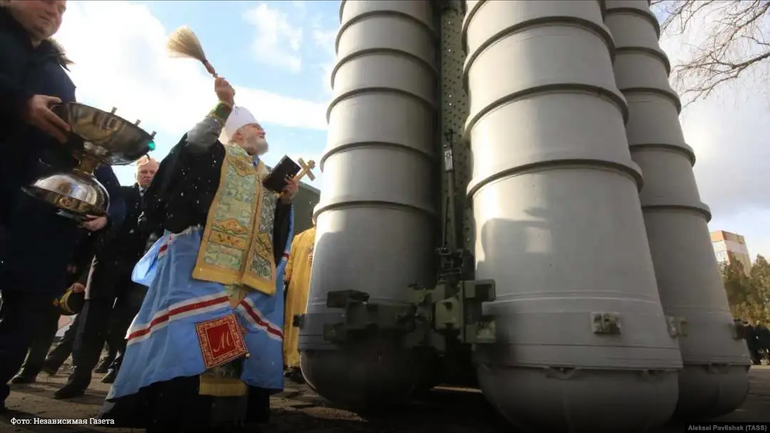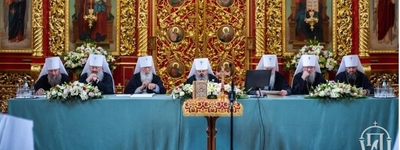Blessing gays, blessing guns

On 20 February 2024, the Synodal Biblical-Theological Commission of the Russian Orthodox Church (ROC), headed by Metropolitan Hilarion (Alfeyev) of Budapest, issued the results of its study of the Declaration of 18 December 2023 of the Roman Catholic Dicastery for the Doctrine of the Faith (DDF), Fiducia Supplicans (FS). It concluded that the document “reflects a sharp departure from Christian moral teaching.”
In an earlier interview, Metropolitan Hilarion had said that FS was a “shock.” (“Russian Orthodox reject Fiducia Supplicans,” Catholic Daily, 25 February 2024; John L. Allen, Jr. “On war’s anniversary, is ‘Fiducia’ a new obstacle to Vatican’s peace push on Ukraine?” Crux, 25 February 2024.)
Fiducia Supplicans was signed by the Prefect of the DDF, Victor Manuel Cardinal Fernández and Mons. Armando Matteo, Secretary for the Doctrinal Section. It was reviewed by Pope Francis, who also signed it. Discussion had been going on, with objections, questions, and responses, for over three years. During this time, Pope Francis had responded to dubia (“doubts” -- formal requests for clarity) from two Cardinals.
FS concerns extra-liturgical pastoral blessings of persons in “irregular situations” (such as divorce and remarriage) and same-sex couples. Much of the document discusses the different types and meanings of “blessing.” One can bless people, objects, places, fruits of the earth and human toil, and other “created realities.” One can bless individual people, and one can bless a union of two people, as in marriage. There are blessings that proceed from God to man, from man to God, and between men. Blessings can be part of the liturgy or church ritual, or they can be informal, given outside consecrated space.
FS, however, emphasizes the pastoral aspect of blessing. It suggests that the Church should not reject people who seek an extra-liturgical, informal or spontaneous blessing, and that we should not judge them as a precondition. A simple, non-ritual blessing should not be refused to persons in irregular situations or to same-sex couples. It does not, after all, legitimize their relationship or conduct. It must not in any way resemble a marriage. The document makes it clear that the Church cannot impart a liturgical blessing upon a union of persons that is contrary to its teaching. Thus, FS does not change the moral teaching of the Church about marriage.
Nevertheless, the controversy over FS continues, not least in the USA, where opposition to Pope Francis combines with anti-Catholic attitudes, political strife in an election year, and controversies about sex and gender. In this context, the intervention of the Moscow Patriarchate plays more than a purely doctrinal role. It can be seen as a slap in the face to Pope Francis, who in his peace-making efforts went to great lengths to try to understand the Russian Church’s position, but has come to see the Kremlin’s aggression for what it is. The ROC document also serves to exacerbate tensions within the Catholic Church. And it tends to deepen divisions in American society in the midst of a presidential campaign, where an apparently pro-Russian candidate is courting both religious and political conservatives.
In one respect, however, the finding of the ROC’s Synodal Biblical-Theological Commission will have limited effect. It cannot be used to claim that FS will help make Ukraine, which Patriarch Kirill has portrayed as a sort of proving-ground for “gay parades” and other forms of Western decadence, an outpost of “gay marriage.” This is not because of FS’s careful distinctions. It is because last December, Major Archbishop Sviatoslav, head of the Ukrainian Greek Catholic Church, stated that FS does not apply to his Church, which has its own theology, canon law, liturgy, and spirituality distinct from those of the Latin-rite Church and understands “blessing” differently. (Communiqué on the reception in the UGCC of the Declaration of the Dicastery of the Doctrine of the Faith “Fiducia Supplicans” on the pastoral meaning of blessings, reported in RISU, 27 December 2023.) Thus, neither FS, nor its rejection by the ROC, can contribute to Moscow’s anti-Ukrainian propaganda.
Some might ask whether it is at all appropriate for an Orthodox Church commission to comment on a Roman Catholic doctrinal statement on Christian morality. There is no apparent reason why it is not. In fact, discussion and constructive criticism of other Churches’ policies can be a part of normal ecumenical cooperation.
This means, of course, that it is also appropriate for Roman Catholic bishops to comment on Orthodox words and actions. And indeed, in a newspaper interview published on 29 June 2022, Kurt Cardinal Koch, president of the Pontifical Council for Promoting Christian Unity, called the Moscow Patriarchate’s support of the war against Ukraine a “heresy.” (Elise Ann Allen, “Top Vatican prelate calls Russian patriarch’s defense of Ukraine war ‘heresy’,” Crux, 30 June 2022.) Indeed -- speaking of “blessings” -- it would not be inappropriate for a Roman Catholic commission to consider the Russian Church’s continued “blessing” of armed aggression. Might it, too, find that its sister Church has engaged in “a sharp departure from Christian moral teaching”?











